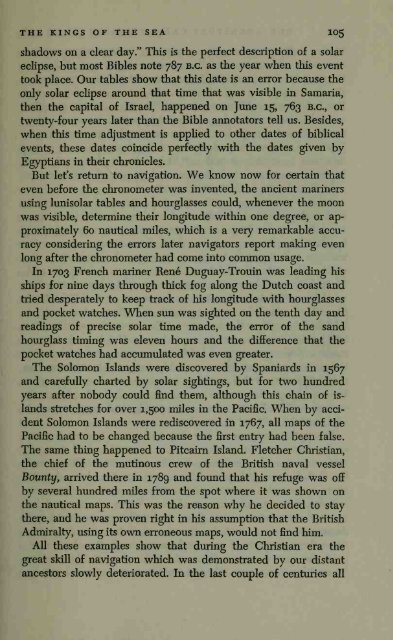You also want an ePaper? Increase the reach of your titles
YUMPU automatically turns print PDFs into web optimized ePapers that Google loves.
THE KINGS OF THE SEA 10$<br />
shadows on a clear day." This is the perfect description of a solar<br />
ecKpse, but most Bibles note 787 B.C. as the year when this event<br />
took place. Our tables show that this date is an error because the<br />
only solar ecHpse around that time that was visible in Samaria,<br />
then the capital of Israel, happened on June 15, 763 B.C., or<br />
twenty-four years later than the Bible annotators tell us. Besides,<br />
when this time adjustment is appHed to other dates of biblical<br />
events, these dates coincide perfectly with the dates given by<br />
Egyptians in their chronicles.<br />
But let's return to navigation. We know now for certain that<br />
even before the chronometer was invented, the ancient mariners<br />
using lunisolar tables and hourglasses could, whenever the moon<br />
was visible, determine their longitude within one degree, or approximately<br />
60 nautical miles, which is<br />
a very remarkable accuracy<br />
considering the errors later<br />
navigators report making even<br />
long after the chronometer had come into common usage.<br />
In 1703 French mariner Rene Duguay-Trouin was leading his<br />
ships for nine days through thick fog along the Dutch coast and<br />
tried desperately to keep track of his longitude with hourglasses<br />
and pocket watches. When sun was sighted on the tenth day and<br />
readings of precise solar time made, the error of the sand<br />
hourglass timing was eleven hours and the difference<br />
that the<br />
pocket watches had accumulated was even greater.<br />
The Solomon Islands were discovered by Spaniards in 1567<br />
and carefully charted by solar sightings, but for two hundred<br />
years after nobody could find them, although this<br />
chain of islands<br />
stretches for over 1,500 miles in the Pacific. When by accident<br />
Solomon Islands were rediscovered in 1767, all maps of the<br />
Pacific had to be changed because the first entry had been false.<br />
The same thing happened to Pitcaim Island. Fletcher Christian,<br />
the chief of the mutinous crew of the British naval vessel<br />
Bounty, arrived there in 1789 and found that his refuge was off<br />
by several hundred miles from the spot where it was shown on<br />
the nautical maps. This was the reason why he decided to<br />
stay<br />
there, and he was proven right in his assumption that the British<br />
Admiralty, using its own erroneous maps, would not find him.<br />
All these examples show that during the Christian era the<br />
great skill of navigation which was demonstrated by our distant<br />
ancestors slowly deteriorated. In the last couple of centuries all

















